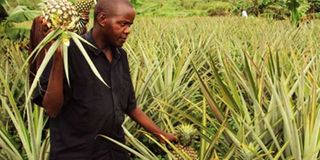Titanic battle as counties take on multinationals over land

The Thika plantation is Delmonte’s sole facility in Africa that supplies pineapple products to its global operations spanning more than 100 countries around the globe. Multinationals and large landowners in the country are facing one of the biggest threats to their businesses since independence after most county governments declined to renew their leases. PHOTO | FILE
What you need to know:
- The simmering row has found its way to the corridors of justice with Del Monte Kenya Ltd suing the leaders of Murang’a and Kiambu counties for refusing to renew its lease.
- Kericho Governor Paul Chepkwony recently made a bold move by banning multinational tea companies in the county from selling their land.
- Del Monte grows pineapples as its principal business and owns a large parcel of land extending between Murang’a and Kiambu counties.
- Kiambu and Murang’a counties have however opposed Del Monte’s application saying the company is not benefiting the local community in any way.
Multinationals and large landowners in the country are facing one of the biggest threats to their businesses since independence after most county governments declined to renew their leases.
The county governments say the large acres of land owned by the multinationals are not benefiting the locals.
The counties want the land subdivided and distributed to the residents.
PEOPLE'S LAND
The simmering row has found its way to the corridors of justice with Del Monte Kenya Ltd suing the leaders of Murang’a and Kiambu counties for refusing to renew its lease.
A while back, Kericho and Nandi counties grabbed the headlines when they announced plans to take over the management of tea estates once multinationals’ 99-year tenures expire.
Kericho Governor Paul Chepkwony recently made a bold move by banning multinational tea companies in the county from selling their land.
It is these concerns that have prompted Del Monte Kenya Ltd to seek protection from court.
In a case filed by lawyer Njoroge Regeru, Del Monte says the emerging trend in the country is worrying.
If the trend is allowed to continue, the firm says, the multinationals, which have invested billions of shillings on the land they sit on, will suffer immensely.
HIGH COURT CASE
The company has asked for a three-judge bench of the High Court to hear an application it has filed against Kiambu and Murang’a counties for declining to renew its lease.
“The arguments by these multinational companies are the same. The fact that some companies are multinational does not mean that they don’t have right over land. They too have a right to have their land leases renewed,” Mr Regeru said when opposing the two counties’ stand that the matter should have been filed at the Environment and Lands Court.
Del Monte grows pineapples as its principal business and owns a large parcel of land extending between Murang’a and Kiambu counties.
The juice maker is seeking court orders directing the two counties to renew its leases saying that if this is not done it risks losing investments worth billions of shillings.
Thousands of jobs are at risk as well, Delmonte adds.
DELMONTE WOES
Kiambu and Murang’a counties have however opposed Del Monte’s application saying the company is not benefiting the local community in any way.
The counties have accused the company of poor working conditions, intimidation of trade unions and discrimination in promotions and remuneration of workers.
They claim that no locals are serving in senior positions while there is a huge difference in pay between Kenyan workers and expatriates.
“Del Monte is a foreign company registered in the New York Stock Exchange and has no single local shareholder from the county,” said Murang’a County through lawyer David Mereka.
The counties say the locals continue to wallow in poverty more than 50 years since independence due to lack of natural resources which are being exploited by multinational companies.
They accuse the foreign companies of shipping all the profits out of the country, leaving residents with nothing.
The decision of the court on the Delmonte case is certain to have a far-reaching implications beyond Murang’a and Kiambu counties.




